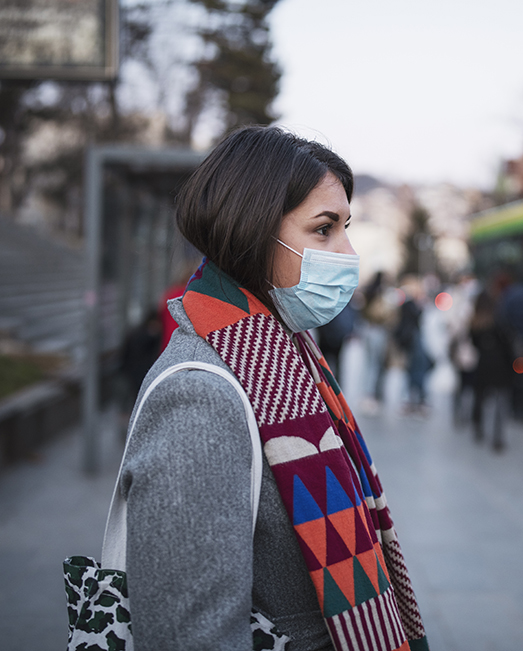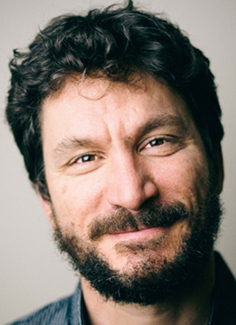Global
Copyright@ Australian Catholic University 1998-2024 | ABN 15 050 192 660 CRICOS Reg: 00004G
Copyright@ Australian Catholic University 1998-2024 | ABN 15 050 192 660 CRICOS Reg: 00004G

Anxiety is a natural response to the threats posed by a global pandemic, says psychology professor Joseph Ciarrochi. We can use it for good by tapping into our inner strength and character.
In the early days and weeks of the coronavirus outbreak, anxiety was spreading across the globe even faster than the virus itself.
The amped-up media reporting of the pandemic caused many of us — or perhaps even most of us — to respond in anxious ways.
Amid a threat as potent as this, a heightened level of individual and collective anxiety is a normal response, says Professor Joseph Ciarrochi, whose research has explored social anxiety and its causes.
“There’s nothing necessarily wrong with anxiety — it’s really just a message or a signal prompting us to respond to a potential danger,” he says.
“But our society teaches us that we should never feel anxious, that anxiety is a bad thing in itself, so we tend to focus on getting rid of it rather than acting to confront the threat.”
As a result, many people resort to extreme measures in order to loosen anxiety’s clutches. “They treat anxiety not as just a message, but as something that’s inherently negative.”
Imagine you get a text from your bank, a warning that your account may have been hacked. This information raises anxiety, a signal that you need to act.
“You get this negative message and you don’t necessarily want it, you don’t like it, but in the end it’s just a message, so you read it and take the necessary actions,” says Ciarrochi, a researcher at ACU’s Institute of Positive Psychology and Education (IPPE).
“Those who treat anxiety itself as a bad thing might respond to that message by doing something drastic, like destroying their phone. Then they might destroy everybody else’s phone too.”
Anxiety is idiosyncratic — there are many different types and many ways to respond. But as COVID-19 continued its spread, ravaging communities as diverse as Milan and Wuhan and raising anxiety all over the world, two distinct pandemic personalities emerged: the denier and the panicker.
The denier downplays the threat and doesn’t take protective action. Take the hordes of bulletproof beachgoers who ignored the advice to stay home and instead flocked to Bondi, putting themselves and others at risk.
In contrast, the panicker responds to anxiety by overreacting. They engage in behaviour that hurts others but also doesn’t keep them safe, like hoarding toilet paper or fighting in the aisles.
The thing that’s common about deniers and panickers is that they are both attempting to escape anxiety, Professor Ciarrochi says.
“The research is clear on this matter: if you seek to deny or panic, your anxiety is likely to get worse.”
Other responses, like excessive drinking and bingeing on Netflix, obsessively checking social media, or just treating the whole thing as a hoax, are also likely to stem from the anxiety the person is feeling. And they can be similarly damaging.
“The reality is that with something like a global pandemic, anxiety is natural and we’ve all got to learn to live with it,” Ciarrochi adds.
“Rather than fighting this anxiety and treating it like an enemy, you need to listen to it and say, ‘Okay, there’s problem here, we need to do something to keep ourselves safe’.
“Once we’ve taken action to deal with the threat, we can then start to use our anxiety in a positive way.”
So how do we remain calm and centred in times of crisis? And can we use our anxiety for good?
The proof, as always, is in the pudding. Amongst the denial and panic that rose in the face of COVID-19 were dozens of examples of people reacting positively and digging in to help each other. People in lockdown singing from windows or exercising on balconies in solidarity with their neighbours. Communities reaching out to those in need, providing supplies and support. Families using online technology stay in touch with their loved ones.
Professor Ciarrochi says the people engaging in these positive acts still experience anxiety, they’ve just managed to tap into their inner strength and character.
“When something shocking like this happens, all of us are taken off guard, and anybody can act badly,” he says.
“The best way to move on from that is to act with character, and that just means being guided by your principles and doing the right things that you need to do: not denying the danger, not going over the top, but realising that we’re all human, and we are all in this together, and that the very thing that allows this virus to spread — our desire for connection — is the very thing that's going to save us as well.”
He identifies some core areas of focus to help us tap into our inner strength and character. We list them here.
Anxiety is a natural bodily response that will “come and go like the weather if you don’t fight it”, Professor Ciarrochi says.
Our goal should be to foster a healthy relationship with these anxious thoughts and feelings, which often serve a purpose. Practicing mindfulness is one technique that can help to achieve this sense of calm.
“It’s just practicing being with the anxiety and acknowledging it, but not reacting to it, just letting it be,” he says.
“That practice of not reacting can be useful in many ways, and with anxiety it simply allows you to avoid a defensive response that makes things worse.
“That way you can focus on the things you can do to address the problem that’s in front of you, the thing that caused the anxiety in the first place.”
Worried about how these uncertain times could affect your life and your livelihood? These are legitimate concerns.
One way to deal with difficult circumstances is to focus on what you value or care about.
“It’s really important to engage in activities that you value, even when you live in a world that is anxiety-provoking,” Professor Ciarrochi says.
That might be cultivating your relationships with those closest to you, making sure to stay active, or just spending more time in the garden. For those whose livelihood is affected, it could mean changing the way you do things.
“You might be forced to think in different ways, or to use creativity to get through the difficult period,” Ciarrochi says.
This will, of course, be harder for some than others. “It’s just about staying committed to what you care about, thinking laterally, and embracing the opportunities this time provides.”
Humans are good at worrying about the future and imagining how things can go terribly wrong. Unfortunately, worry won’t make the dangers go away.
“At some point, we need to let go of worry and just live here and now,” Professor Ciarrochi says. “That means focusing on what you can do to make your life better, to contribute in a positive way, or to enjoy yourself or express friendship and love.”
Research suggests we are also notoriously bad at predicting how long a disastrous event will affect us.
“People bounce back from bad events much faster than they think they will,” he says.
“Think of some of the major disasters that have happened over the last 20 years, and how we humans were able to recover and put those disasters in the past.
“No matter how bad things seem right now, remind yourself that we will bounce back and life will get better again.”
One of the cruellest aspects of the coronavirus is the effect it’s had on reducing physical contact between human beings.
Touch has been shown to strengthen relationships and help people to convey emotions like compassion and gratitude. But while this lack of touch will undoubtedly have a negative effect on some people, especially those who live alone, Professor Ciarrochi points out that physical distance is not the same as psychological distance.
“You can still feel psychologically close to someone even if they are a thousand miles away,” he says. “Just like you can feel distant from someone who is standing right next to you.”
In that sense, we are better equipped now than ever in the past to stay in touch with those we hold close.
“It might mean we need to make a deliberate effort to connect with people in new ways, but it is incredibly important to stay connected … our health depends on it.”
Connecting with others through online communities is another way to ensure we are remaining in touch with society — but only if we are engaging in a kind and positive way.
“Act with kindness,” Ciarrochi says. “Be generous. Not only will this make your fellow human more kind and more generous, it will make you happier and healthier.”
Coronavirus may have forced many of us to change the way we live, but not all those changes need to be negative, Professor Ciarrochi says.
Perhaps, in the long-term, the crisis — and the danger it poses — will change the world for the better.
“Danger is always around us in our everyday lives, but we rarely noticed it, it’s almost invisible,” he says.
Now that the danger of the pandemic has “woken us up”, perhaps it will force us to ask ourselves questions about the way we live.
“If you look at other times in history when the world has been faced with extreme challenges, they have led to lots of innovations that improved society,” he says.
“As horrible as World War II was, it led to lots of positive changes, like women having more of a role in society, and many technological advances that shaped the world in the decades that followed.
“So while we wouldn't want to have World War II again, there were definitely things made better as a result of it, and I think we got to look for that in this instance, too.
“We’re going to have to live a little differently, but what we might do is learn how to live better in some ways, and to tread more lightly, so that when this passes, we will have improved the human condition.”

Copyright@ Australian Catholic University 1998-2024 | ABN 15 050 192 660 CRICOS Reg: 00004G